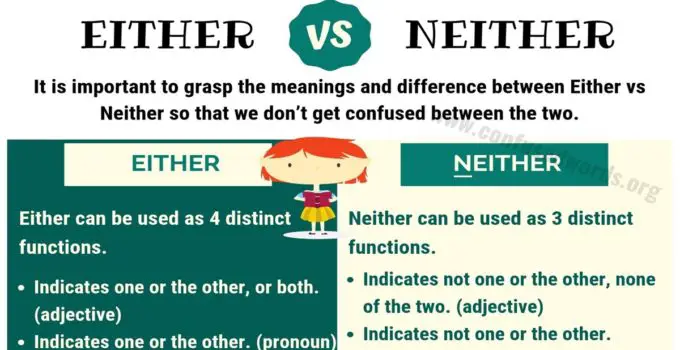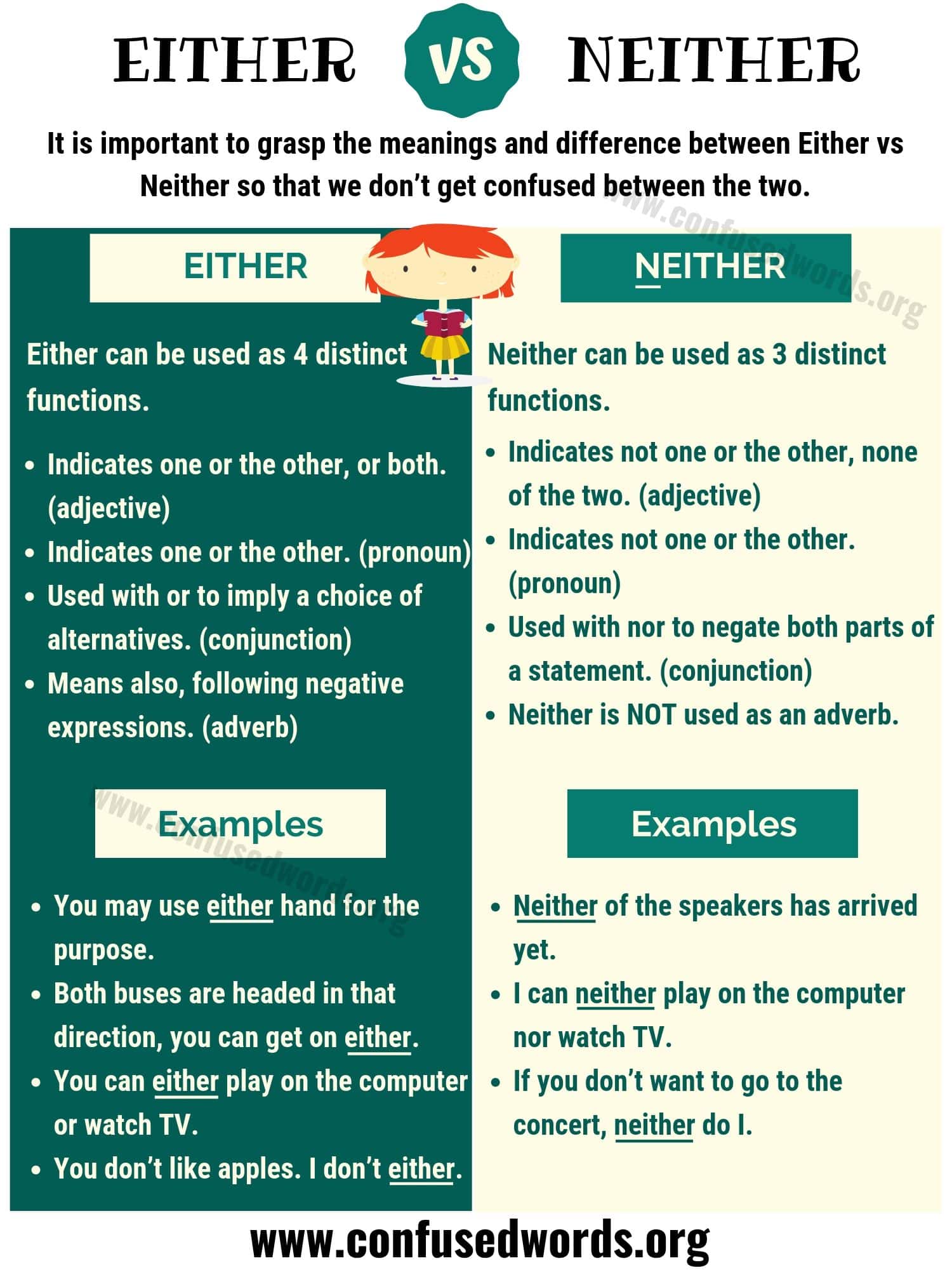Either or neither!!! Either and neither are two words that are often used interchangeably in the English language. However, they have distinct meanings and are used in different contexts. Understanding the difference between either vs. neither is important in order to use them correctly in writing and speech. In this article, we will explore the differences between either vs. neither and provide examples of their correct usage in sentences.
Contents
Either or Neither
Difference Between Either vs. Neither
“Either” is used to indicate a choice between two or more items. For example, “You can either have pizza or pasta for dinner.” It can also be used in addition to something else, such as “I will either go for a run or do yoga this morning.”
On the other hand, “neither” is used to indicate that none of the options presented are applicable. For example, “Neither option is suitable for me.” It can also be used in combination with “nor” to indicate that two negative options are not applicable. For example, “I neither like nor dislike mushrooms.”
Fine Distinctions Between Either vs. Neither
While “either” is a positive word, “neither” is a negative word. “Either” is used to present options, while “neither” is used to negate options.
Here are some fine distinctions between the two words:
- “Either” implies a choice, while “neither” implies exclusion.
- “Either” is used when there are two or more options, while “neither” is used when there are no options.
- “Either” is used with “or,” while “neither” is used with “nor.”
It’s important to use these words correctly to avoid confusion and ensure clear communication.
Either and Neither in Sentences
Both words are used to indicate a choice between one or another item or in addition to something else. However, their connotative use is very different from one another. Neither is a negative connotation and technically means the opposite of either.
Either and Neither in Negative Statements
In negative statements, neither is used to indicate that none of the options is true. For example:
- Neither of us wants to go to the party.
On the other hand, either is used to indicate that one of the options is true. For example:
- Either she is lying or he is telling the truth.
Either and Neither in Affirmative Statements
In affirmative statements, either is used to indicate that one of the options is true. For example:
- Either we can go to the beach or we can go to the park.
Whereas, neither is used to indicate that none of the options is true. For example:
- Neither of us knows how to cook.
Either and Neither in Questions
In questions, either is used to offer a choice between two options. For example:
- Would you like tea or coffee?
Whereas, neither is used to indicate that none of the options is true. For example:
- Do you want to go to the movies or stay home?
Either and neither are used to indicate a choice between one or another item or in addition to something else. Neither is a negative connotation and technically means the opposite of either. In negative statements, neither is used to indicate that none of the options is true, whereas in affirmative statements, either is used to indicate that one of the options is true. In questions, either is used to offer a choice between two options, whereas neither is used to indicate that none of the options is true.
Either and Neither with Other Parts of Speech
Either and Neither with Adverbs
Either and neither can be used as adverbs to indicate a choice between two things or to show agreement or disagreement with a statement.
For example:
- Either you come with me or stay here.
- Neither of us likes coffee.
Either and Neither with Conjunctions
Either and neither can also be used as conjunctions to connect two words or phrases. Either is paired with or, while neither is paired with nor.
For example:
- You can either come with me or stay here.
- Neither John nor Sarah likes coffee.
Either and Neither with Determiners
Either and neither can also be used as determiners to modify a noun. When used as determiners, either means one or the other, while neither means not one or the other.
For example:
- You can choose either of these two options.
- Neither of us wants to go to the party.
Either and neither can be used as adverbs, conjunctions, and determiners to indicate a choice between two things, show agreement or disagreement, connect two words or phrases, and modify a noun. It is important to use either and neither correctly to avoid confusion and convey the intended meaning clearly.
Common Mistakes with Either and Neither
Using Both Instead of Either or Neither
One common mistake people make is using “both” instead of “either” or “neither.” “Both” refers to two things being true at the same time, while “either” and “neither” refer to a choice between two options. For example, saying “Both options are good” implies that both options are chosen, while saying “Either option is good” means that only one option can be chosen.
Using Either and Neither Incorrectly
Another mistake is using “either” and “neither” interchangeably. While both words indicate a choice between two options, they are not synonyms. “Either” is used when one of two options is chosen, while “neither” is used when none of the options are chosen. For example, saying “I don’t like either option” means that you don’t like either of the two options while saying “I like neither option” means that you don’t like either of the two options.
Using Me Either or Me Neither
Finally, some people make the mistake of saying “me either” or “me neither” instead of “neither do I” or “either do I.” “Me either” and “me neither” are not grammatically correct and should be avoided. Instead, use “neither do I” or “either do I” to express agreement or disagreement with a negative statement.
Remember, either and neither are used to indicate a choice between two options, but they are not interchangeable. Avoid using “both” when you mean “either” or “neither” and use “neither do I” or “either do I” instead of “me either” or “me neither.”
Conclusion:
The words “either” and “neither” are both complex words that can be used in different contexts and carry different meanings. It is important to remember that “either” indicates a choice between two or more items, while “neither” suggests a choice in a manner that emphasizes that neither option is acceptable.
To avoid confusion, it is helpful to remember that “either” is a positive word and is often used to suggest a dual choice. On the other hand, “neither” is a negative word and is used to suggest that neither option is acceptable.
In summary, remember that “either” goes with “or” and “neither” goes with “nor.” It is always a good idea to check examples whenever you need to confirm that you are using the correct word in the right context. With practice, you can master the use of “either” and “neither” and use them with confidence in your writing and speech.
Either or Neither | Infographic
Either or Neither – What’s the Difference?
Related links:

